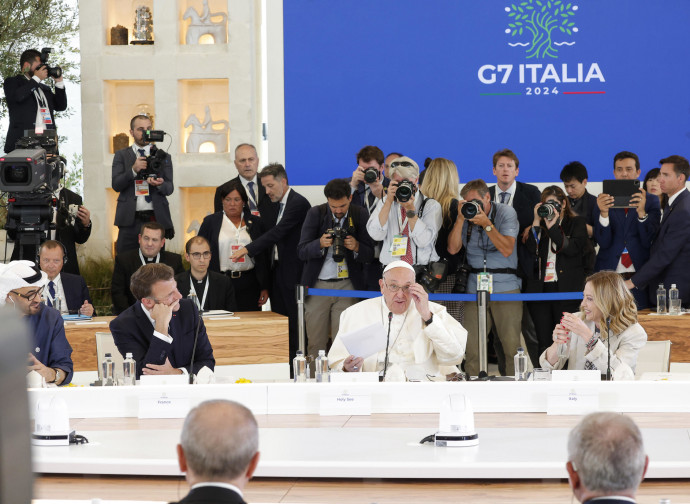The Pope at the G7, an opportunity missed
The speech on Artificial Intelligence was full of useless technicalities and poor in terms of foundations for the desired ethical choices. No reference to God and Jesus, nor to natural law. But the person, morality and politics do not hold up without God.

On 14th June in Borgo Egnazia (Puglia, Italy), Pope Francis spoke about Artificial Intelligence (AI) to the G7 Leaders. His speech, with some off-the-cuff additions, was shorter than the text that was distributed. This in fact is full-bodied and articulate, with long and very technical analytical forays into the meanders of the AI issue. For the pope, artificial intelligence stems from man's own impulse towards the 'beyond', as has already happened with other technical inventions throughout its history.
This time, however, there is something radically new: the tool is strongly ambivalent ('fascinating and tremendous at the same time'), has a disruptive 'cognitive-industrial' impact that will build 'a new social system', and above all can have a certain independence from mankind by applying 'algorithmic choices'. The risk is that man will be deprived of his decision-making capacity and thus 'condemned to depend on machines'. A case in point is the use of 'lethal autonomous weapons' in armed conflicts.
After having spent a long time, on the part 'The Basic Mechanism of Artificial Intelligence', analysing the main engineering possibilities for the development of AI and the fears they arouse, Francis proposes two ways to deal with the phenomenon and govern it: the ethical way and the political way.
The first path should 'put the dignity of the person at the centre in view of a shared ethical proposal'. Here he extolled the 2020 Rome Call for all Ethics event that proposed to launch an 'algoretic', an ethics of algorithms based on shared principles.
The second way would be to support good politics against the absolute domination of the 'technocratic paradigm'. Politics should not be weakened, 'Politics is needed!' This 'sound politics' should, however, take into account that the world situation has serious structural deficiencies and patches are not enough.
On the whole, Francis' text is weak. On the one hand there is a redundancy of technical aspects that are not necessary in a pontifical teaching. On the other, there are references to ethical and political solutions based on a desirable (but its foundations unspecified) consensus. Even the concept of the human person is not clarified from the perspective of the Catholic Church, while lamenting its loss in today's society. In summary, the proposal was this: let us seek agreement together on certain principles as was attempted at the Rome Call for all Ethics. A good thing for a political intervention, too little for a pontifical intervention.
The dignity of the human person, for example, what is it based on and how is it defended? From the Catholic Church's point of view, its defence is not indifferent to God's presence in human history. But Francis never mentions God in all his discourse, nor even Jesus Christ. The 'consensus' on adequate ethical principles, then, on what should it be based? Catholic doctrine proposes natural law and natural moral law, which do not change and are therefore practicable even in the age of IA. They make possible a 'natural grammar' that is the basis of a dialogue and consensus that is not only based on the convergence of opinions or, worse, interests.
But in this intervention by Francis, there is never any mention of either one or the other. Even the reference to ethics remains as if suspended in the air without the support of natural and divine law. Finally, the reference to politics: the adjectives 'sound' and 'good' applied in the papal discourse to this word are based on what? Without references to natural and divine law, there remains little room for legitimising politics in an unconventional way. AI risks leading us towards an artificial world, it can only be controlled by referring to a real and true world and not only to convergences of opinions that are also artificial.
The lack of a foundation is the most striking aspect of the Borgo Egnazia speech, and since the foundation for the Catholic Church is God, it is striking that Francis never mentioned Him. The person, morality and politics do not hold up without God, and humanity alone will never find the strength to face the risks and endure the fatigue required by these challenges. It was not a question, when speaking of God, of proselytising in front of the various Macrons, but of pointing out the superior 'hook' that holds the whole construction together.
If, for comparison, we refer to the last chapter of Benedict XVI's Caritas in veritate, we find a different modulation. The theme of this chapter is certainly not artificial intelligence but, more generally, technology and the 'spirit of technicality'. In 2009, the topic at Borgo Egnazia had not yet exploded. At the time, Benedict spoke of the 'natural moral law': 'It is necessary for man to return to himself in order to recognise the fundamental norms of the natural moral law that God has inscribed in his heart'. Here he speaks both of natural law and of God, its creator: 'God reveals man to man; reason and faith work together in showing him the good, only if he wants to see it; natural law, in which creative Reason shines forth, indicates man's greatness but also his misery when he disregards the call of moral truth'.
